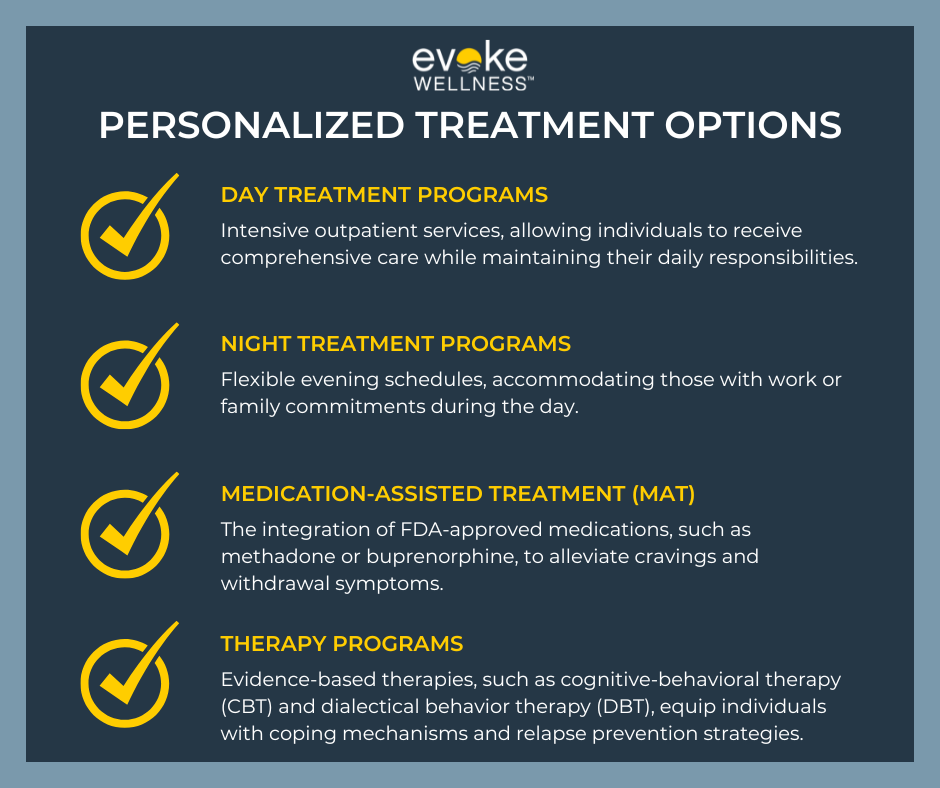Embarking on the journey to lifelong sobriety is a courageous decision that requires dedication and support. Substance abuse treatment programs provide the essential foundation for your recovery, equipping you with the tools and strategies needed to maintain sobriety long-term. According to the National Institute on Drug Abuse, treatment can increase the odds of sustained recovery by up to 60%. At Evoke Wellness at Waltham, our comprehensive approach includes day treatment, night treatment, medication-assisted treatment, and various therapy programs tailored to your unique needs. This article will explore how these evidence-based treatment modalities work together to prepare you for a life free from addiction, empowering you to reclaim control and build a brighter future.
Together, let’s embrace the journey to recovery and the promise of a new beginning. Call us at (833) 287-7223 today or reach out online.
The Importance of Preparation in Substance Abuse Treatment
Embarking on the journey towards lifelong sobriety requires a solid foundation. Comprehensive substance abuse treatment programs are designed to lay the groundwork for sustainable recovery by addressing the multifaceted aspects of addiction.
A Holistic Approach
Effective treatment plans take a holistic approach, targeting the physical, mental, and emotional factors that contribute to substance use disorders. Through a combination of evidence-based therapies, counseling, and support services, individuals are equipped with the tools to navigate the challenges of early sobriety and develop coping strategies for long-term success.
Building a Strong Foundation
By addressing the root causes of addiction and equipping individuals with the necessary tools, comprehensive substance abuse treatment programs lay the groundwork for a successful and sustainable recovery journey. With proper preparation, individuals can confidently embark on the path towards lifelong sobriety, armed with the knowledge, skills, and support system to overcome obstacles and maintain their hard-earned progress.
The Preparation Stage of Addiction Recovery
Addressing Underlying Issues
The preparation stage lays the groundwork for long-term sobriety by identifying and addressing the root causes contributing to substance abuse. This crucial phase involves exploring past traumas, mental health conditions, and environmental factors that may have influenced addictive behaviors. Through evidence-based therapies and counseling, individuals gain insight into their unique challenges and develop coping strategies to manage triggers and prevent relapse.
Building a Support System
During this stage, individuals are encouraged to establish a strong support network. This may include family members, friends, support groups, or peer recovery coaches who can provide encouragement, accountability, and a sense of community throughout the recovery journey. Building a reliable support system helps individuals feel understood and empowered, increasing their chances of success.
Developing a Personalized Treatment Plan
The preparation stage involves collaborating with healthcare professionals to create a comprehensive and personalized treatment plan. This plan may incorporate various evidence-based approaches, such as cognitive-behavioral therapy, medication-assisted treatment, or holistic therapies, tailored to the individual’s specific needs and circumstances. By actively participating in the development of their treatment plan, individuals gain a sense of ownership and commitment to their recovery process.
According to a recent study by the National Institute on Drug Abuse (NIDA), individuals who engage in comprehensive substance abuse treatment programs that address underlying issues and provide ongoing support are more likely to achieve and maintain long-term sobriety.
Inpatient Preparation: Getting Ready for Residential Treatment
Assessing Your Needs
Before entering inpatient treatment, take an honest look at your substance use disorder and overall well-being. Residential programs offer intensive, round-the-clock support – so be prepared to fully commit and engage in the process. Reflect on any mental health issues, medical conditions, or personal circumstances that may impact your care.
Practical Arrangements
Inpatient stays typically last 30-90 days. Arrange leave from work or school, find temporary housing for children or pets, and settle any outstanding obligations. Pack essentials like comfortable clothing, toiletries, and reading materials. Most programs prohibit electronic devices to minimize distractions during early recovery.
Emotional Readiness
Checking into a residential facility can feel daunting, but try to approach it with an open mind. The structured environment provides stability and accountability as you regain your footing. Surround yourself with the professional support system and embrace any recommended therapies – individual, group, family counseling, medication-assisted treatment, holistic methods, and more.
Continued Care
An inpatient program lays the critical foundation, but recovery is an ongoing journey. Work closely with staff to develop an aftercare plan that builds on your progress through outpatient services, sober living arrangements, community resources, and lifestyle changes. With commitment and the right preparation, residential treatment can catalyze lifelong sobriety.
The Three Goals of Substance Abuse Treatment
Effective substance abuse treatment programs aim to help you achieve three main goals on your journey to lifelong sobriety.
Achieve Sustained Abstinence
- The primary focus is supporting you in stopping substance use to begin and maintain a life free of mind-altering substances.
- According to a 2020 study, individuals who complete comprehensive treatment are up to 60% more likely to achieve sobriety compared to those who don’t receive treatment.
Develop Healthy Coping Mechanisms
- You’ll learn positive coping strategies and life skills to manage cravings, triggers, and life stressors without turning to substances.
- Cognitive-behavioral therapy, mindfulness practices, and support groups equip you with tools for emotional regulation and relapse prevention.
Build a Fulfilling Life in Recovery
- Quality programs address co-occurring mental health issues, provide counseling for repairing relationships, and assist with goals like education, employment, and housing.
- Rebuilding a rich, substance-free lifestyle increases your commitment to an addiction-free future focused on personal growth.
Through this three-pronged approach – stopping use, managing triggers, and lifestyle rebuilding – you develop the foundation for lifelong recovery.
Comprehensive Treatment Planning for Lasting Change
A Personalized Roadmap
Effective substance abuse treatment begins with a comprehensive evaluation to understand your unique situation, challenges, and goals. From there, an individualized treatment plan is developed – a detailed roadmap tailored just for you. This plan outlines the specific therapies, interventions, and support services needed to address the root causes of addiction and lay the foundation for lifelong recovery.
Integrated Approach
Modern treatment recognizes that substance abuse is often accompanied by co-occurring mental health disorders like depression, anxiety, trauma, or an eating disorder. A well-rounded treatment plan incorporates evidence-based therapies to tackle these interconnected issues simultaneously. By taking an integrated approach, the underlying factors driving the addiction cycle can be effectively disrupted.
Continuum of Care
Recovery is an ongoing journey, not a singular event. Your treatment plan will provide a structured continuum of care with varying levels of support as your needs evolve. This may include medical detox, residential inpatient rehab, intensive outpatient programs, sober living, and community-based peer groups. A comprehensive plan ensures you have the resources and guidance to maintain sobriety through every stage.
Relapse Prevention Strategies
Even with commitment, relapse is an unfortunate reality for many in recovery. An effective treatment plan prioritizes relapse prevention by equipping you with vital coping mechanisms and a support network. You’ll develop skills for identifying triggers, managing cravings, challenging negative thought patterns, and making lifestyle adjustments to minimize future setbacks.
With a personalized, multi-faceted treatment plan, you’ll be empowered to break free from the grip of addiction and embrace a life of renewed health and purpose. The path is challenging, but consistent professional support increases your likelihood of achieving long-term sobriety.
Exploring Different Treatment Modalities
Day Treatment Programs
Day treatment programs provide intensive outpatient services, allowing you to live at home while attending counseling and therapy sessions during set hours. These highly structured programs help establish a routine and support system crucial for early recovery.
- Evidence-based therapies target relapse prevention strategies
- Group sessions foster accountability and shared learning
- Holistic services address mind, body, and spiritual needs
Medication-Assisted Treatment (MAT)
For certain substance use disorders, medication can be an effective adjunct to counseling. MAT programs use FDA-approved medications to alleviate cravings and withdrawal symptoms.
- Medications like buprenorphine and naltrexone curb opioid cravings
- Disulfiram and acamprosate aid alcohol addiction recovery
- Frequent monitoring promotes adherence and prevents misuse
Night Treatment Programs
Night treatment, or partial hospitalization programs (PHPs), provide a middle ground between inpatient and outpatient care. You live independently but receive intensive treatment several nights per week.
- Group and individual therapy multiple evenings weekly
- Case management services coordinate care and support
- Highly structured yet allows work/family obligations
Therapy Programs
Cognitive behavioral therapy (CBT) and other evidence-based therapies are core components of most programs. Group and individual sessions equip you with coping skills.
- CBT identifies and modifies harmful thought patterns
- Dialectical behavior therapy builds mindfulness and distress tolerance
- Family therapy strengthens relationships and support networks
Through exploring diverse treatment modalities, you gain a comprehensive recovery toolkit tailored to your unique needs and situation.
FAQ: How Substance
How does substance abuse treatment work?
Effective substance abuse treatment involves a comprehensive, multi-pronged approach tailored to each individual’s needs. Common elements include:
- Detoxification to safely manage withdrawal symptoms
- Behavioral therapy to modify underlying thoughts and habits
- Medication-assisted treatment to reduce cravings
- Support groups providing encouragement and accountability
- Lifestyle changes promoting physical and mental wellness
The goal is lifelong sobriety through stopping drug use, staying drug-free, and achieving productive family, work, and social functioning.
What are the different treatment program options?
Treatment programs vary in intensity and time commitment:
- Inpatient/residential treatment provides 24/7 supervised care
- Partial hospitalization/day treatment offers daily treatment with overnight home stay
- Intensive outpatient programs involve frequent counseling sessions
- Standard outpatient treatment meets just 1-2 times per week
The appropriate level depends on the severity of the addiction, co-occurring mental health issues, home environment, and other individual factors.
How effective is substance abuse treatment?
Research shows treatment can help patients stop using drugs, avoid relapse, and recover their lives. However, relapse rates for addiction are similar to other chronic diseases. Thus, a comprehensive aftercare plan is vital.
According to a 2019 national survey, over 19 million Americans struggled with a substance use disorder. Sadly, only 1 in 10 received specialty treatment that year. With proper, evidence-based care, many more could achieve recovery.
Conclusion
In conclusion, substance abuse treatment provides you with the essential tools and support to build a foundation for lifelong sobriety. Through comprehensive programs like day treatment, night treatment, medication-assisted treatment, and various therapy options, you’ll develop crucial coping skills and strategies to maintain your recovery. Recent studies show that individuals who complete formal treatment programs have significantly higher rates of long-term abstinence, with success rates increasing up to 60% for those who engage in ongoing aftercare. By investing in your recovery through professional treatment, you’re taking a vital step towards reclaiming control of your life and achieving lasting freedom from addiction. Remember, recovery is a journey, and with the right preparation and support, you can overcome substance abuse and thrive in sobriety.
Begin Your Journey with Evoke Wellness at Waltham
If you or a loved one is considering outpatient treatment, Evoke Wellness at Waltham invites you to contact us. Our compassionate team is ready to answer your questions, discuss your needs, and help you take the first steps toward recovery. At Evoke Wellness, you will find more than just a treatment program – you’ll discover a community dedicated to your wellness and success. Together, let’s embrace the journey to recovery and the promise of a new beginning. Call us at (833) 287-7223 today or reach out online.



